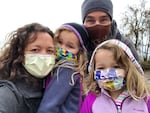Many of Erin Boni’s shifts begin with a text telling her that the nursing units will be short staffed. She’s a medical intensive care nurse at OHSU, where she has worked for the past 10 years. In the past 10 months, her job has changed a lot.
Boni, along with frontline healthcare workers across the country, have watched COVID-19 caseloads grow, change, and reshape life as most people know it. Recently, they have watched ICU beds across the state fill up as the coronavirus reaches its highest levels since the start of the pandemic, in Oregon and nationwide.

Erin Boni, an ICU nurse at OHSU, shown with her family.
Courtesy Erin Boni
The state saw a record 24 deaths on Monday, Dec. 1 from the coronavirus. One of them was at Asante Rogue Regional Medical Center in Medford, where infectious disease physician Pratibha Seshadri works. In her years in the medical field, she has never dealt with anything like COVID-19.
“I think part of the challenge has been keeping up with all the literature coming out,” Seshadri told OPB’s “Think Out Loud.”
From constant new treatment and drug developments to caring for critically ill COVID-19 patients who don’t believe they’ve contracted the virus, Seshadri said the pandemic has been a lesson — mostly in human psychology.
She’s learned a lot about the virus in the past ten months, too.
“In March, we were a little bit at sea,” Seshadri said. Since then, medical professionals have gained a much better understanding of how the virus transmits and what treatments work best for critically ill patients. One method that has been effective is proning, or placing people on their stomach.
But the level of care required for many COVID-19 patients can put a toll on the nurses and doctors who work with them, something Erin Boni knows very well.
“Sometimes you enter the rooms of these critically ill patients,” said Boni. “and the only time you get to leave is if you have another staff member to swap you out.”
Critically ill patients need to be turned every two hours, Boni said, but turning people who are lying prone can require four to six trained staff assisting. One small shift while turning could dislodge a patient’s breathing tube or cannula, and that can be the difference between life and death in a matter of minutes.
Also, short-staffed medical intensive care units can mean that some nurses are picking up extra 12-hour shifts or extending their workdays to 16 hours long. That can make even seemingly basic job functions like turning a patient over become much more stressful.
Hospitals such as OHSU would typically hire traveling nurses to work in 12-week periods when short staffed, but these resources are stretched thin due to a nationwide need right now. Other nurses are cutting back their hours because of stress, and some are leaving the job because the risk to themselves or family members is too great to continue working, Boni said.
For Boni, that risk is doubled: both she and her husband work in medical intensive care units with COVID-19 patients, and have two daughters at home.
“Coming home and being the sole caregiver for two young children, and trying not to bring that into their lives, has been a big challenge for us,” she said. “And I know I’m not alone.”
Although the past 10 months of her work has been focused on figuring out how to take care of COVID-19 patients, the pandemic has also forced Boni to learn how to care for herself.
“I think most of us on the ground right now are almost always hovering on a teetering point,” she said. “One more thing, and we could go over the edge. It has really forced a lot of us how to figure out how to take care of ourselves and take care of each other.”
To hear more from “Think Out Loud’s” conversation with Erin Boni and Pratibha Seshadri, click the “play” arrow at the top of the page.
Contact “Think Out Loud®”
If you’d like to comment on any of the topics in this show or suggest a topic of your own, please get in touch with us on Facebook or Twitter, send an email to thinkoutloud@opb.org, or you can leave a voicemail for us at 503-293-1983. The call-in phone number during the noon hour is 888-665-5865.
